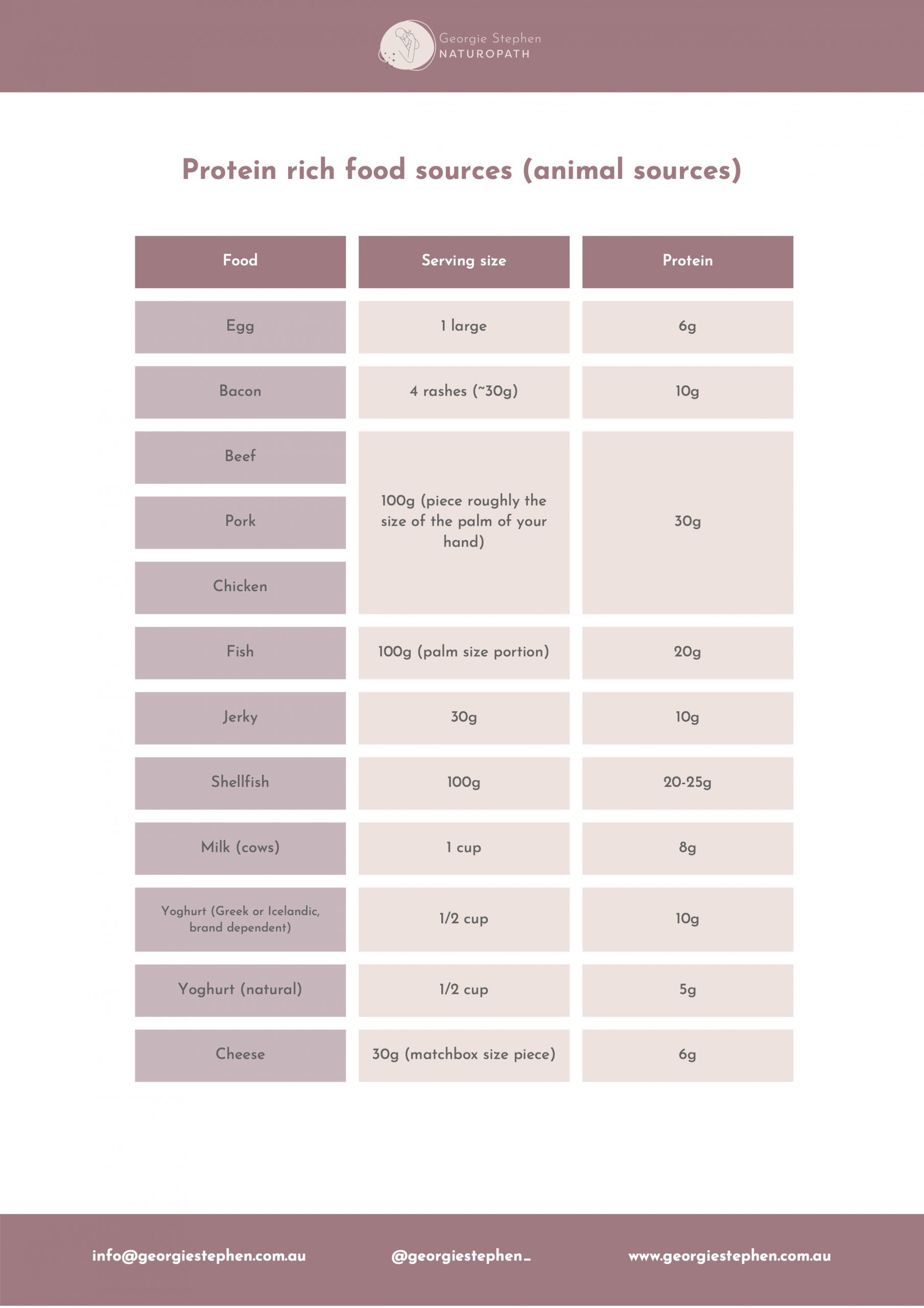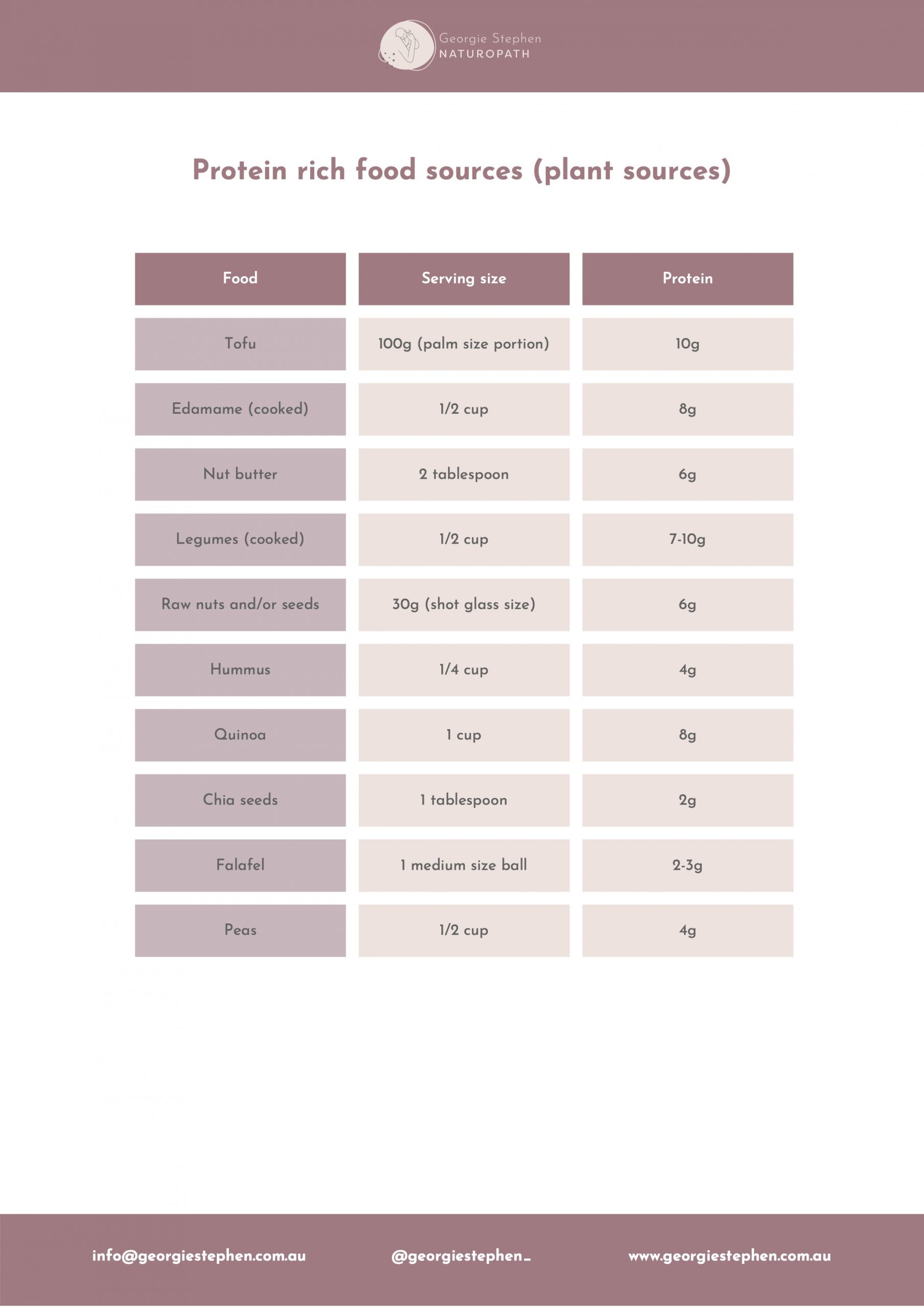PUBLIC SERVICE ANNOUNCEMENT:
Mama, you’re probably not eating enough protein!
As a new mother, your protein needs are high. Like, really high.
You’re recovering from pregnancy and birth, which requires protein to heal tissues from both processes. You may also be breastfeeding, which bumps your protein needs up to support your own health while you transfer precious protein into your breastmilk. Plus, you’re learning new mothering skills, coping with sleep deprivation, and managing stress – all things that require extra protein to keep you functioning as best you can.
But, that’s not even the most important thing.
The number one reason I recommend mums eat a protein-rich breakfast is because of energy.
It supports stable energy throughout the day, so that you can face all the challenges and demands that come your way in the day of mothering ahead.
What is protein?
Protein is one of three macronutrients required by the body (the other two being carbohydrate and fat). It is required for almost every single bodily process and can be found in every cell throughout the body. Therefore, it is absolutely crucial that we consume enough protein to support the overall health and optimal functioning of our body.
Disclaimer:
The information provided in this blog is for your personal or other non-commercial, educational purposes. It should not be considered as medical or professional advice. We recommend you consult with a GP or other healthcare professional before taking or omitting to take any action based on this blog. While the author uses best endeavours to provide accurate and true content, the author makes no guarantees or promises and assumes no liability regarding the accuracy, reliability or completeness of the information presented. The information, opinions, and recommendations presented in this blog are for general information only and any reliance on the information provided in this blog is done at your own risk.
Functions & uses of protein for mothers
Protein is needed for countless biological processes that affect how we feel and how our body functions in early motherhood
Protein is needed:
- As a building block to for tissue, including for skin, hair & nail health, and muscles
- For the repair of body tissues, particularly supporting the body as it physically recalibrates and recovers from pregnancy and birth
- For healing, which is relevant to any mother following a caesarean, epistiotomy, tear, or other birth injury
- As the backbone of enzymes involved in digestion, energy metabolism, and mood regulation
- As the building block for neurotransmitters, which are the chemical messengers of the nervous system, involved in cognition, memory, mood, and sleep
- For hormone production involved in regulating metabolism and reproductive function
- To support immune system function
Why protein at breakfast?
Consuming a protein-rich meal for your first meal of the day sets you up for a strong start to the day.
A protein rich breakfast can:
- Provide stable energy for the busy day ahead (avoiding those energy slumps)
- Reduce blood sugar spikes and crashes
- Keep you feeling full throughout the morning and beyond
- Reduces cravings and the need for snacking

The trouble with a protein-deplete breakfast
Quite often, when I begin working with a tired new mum, I quickly see that breakfast could be part of the problem for low energy.
We’ve all been brought up on cereal and toast for breakfast, but these are far from ideal foods to begin the day from an energy perspective. Unfortunately, they are high in carbohydrates and low in protein (and fat), resulting in a greater blood sugar response after eating. This sends the body on the blood sugar rollercoaster, where glucose levels rise quickly only to crash down shortly after.
I explore this concept of the blood sugar rollercoaster and how it affects our energy in this post here.
Not only this, but if we’re not getting some good quality protein in our bodies in the morning, it means we have to catch up throughout the rest of the day. This is not impossible, but certainly more challenging. See the section below to see how much protein you need each day, but I’ll use myself as an example here – I need around 96g of protein each day for my body size, meaning if I skip protein at breakfast, I need to eat two meals with around 45g of protein (plus a protein rich snack). Check out the protein-rich foods table to see just how much you would need to eat to make up 45g x 2.
Signs you may not be eating enough protein
Because of the far-reaching influences of protein, the signs and symptoms of insufficient levels are diverse, and may include:
- Low energy or fatigue
- Poor sleep quality
- Low mood or anxiety
- Acne and skin problems
- Hormonal imbalance
- Irregular periods
- Fertility challenges
- Early ageing
- Altered digestion and bowel movements
- Poor immunity
- Premature ageing
- Injuries and pain
How much protein do you need?
Current research suggests that protein needs may be higher than previously recommended.
Conventional recommended daily intake levels are set way too low and based on old science. New research is showing that optimal protein intake levels for good physical and metabolic health are more like 1.5-2.0g/kg/day.
For most mothers, this means at least 100g of bioavailable protein each day (but you can do the math by calculating 1.5 x your body weight). For example, if your body weight is 68kg = 68 x 1.5 = 102g of protein/day.
Mothers who are in early postpartum (aka the fourth trimester), exclusively breastfeeding, sleep deprived, or quite physically active, will need to aim for the middle to higher end of the range (i.e. 1.8-2.0g/kg/day).
Protein at breakfast: how much?
This really depends on your own personal total daily protein needs. I recommend aiming for around a quarter of your daily needs at breakfast.
So, for example, my daily protein needs are around 96g/day, meaning my breakfast should aim to include 24g of protein. Use the list below to guide you around how to build a meal containing around about ¼ of your daily needs, and see the list breakfast ideas for some inspiration.
Protein-rich foods
Please note that the amounts provided below are an estimate and protein content may vary depending on the food source, specific brand, manufacturing process, and other factors.


10 Protein-rich breakfast ideas
Keep in mind here that any food goes for breakfast; it doesn’t have to be traditional breakfast foods like toast or cereal or cooked eggs. Leftovers can work really well, as dinner meals are often more protein-rich, or you can set aside some time to batch cook one or two meals specifically for breakfast, pop them in the fridge or freezer and heat & go in no time at all.
- Eggs cooked any way with sides of your choice:
- With extra protein options: bacon, sausage, fried halloumi (these all contain extra protein)
- With other nourishing veg options: avocado, sautéed mushrooms, sautéed spinach, roasted tomatoes, sliced raw veg, sauerkraut, olives, pickles
- Smoked salmon + avocado
- Leftover meats from dinner, served in a mountain bread wrap or corn tortilla with avocado
- Soups, stews, casseroles, curries – if you batch cook these in advance or eat dinner leftovers, these are so easy to reheat and eat with minimal prep
- Baked frittata – make once and eat multiple mornings of the week
- Yoghurt + toppings – fruit, nuts/seeds, natural muesli
- Bone broth + meat (leftover from dinner, e.g. sliced steak) or with a few boiled eggs
- Toast with sardines + avocado
- Smoothies with protein powder, nut butter, raw nuts, hemp & chia seeds
- Homemade baked beans with a fried or poached egg + a large dollop of tzatziki
Or any other protein-rich foods you enjoy!
Make a plan
I always tell the mums I work with that knowing what to do is only the first step. The next is planning, then acting or implementing. So take some time to consider how you might be able to include more protein rich foods in your breakfast. Jot down a list of the protein-rich foods you like and enjoy. Then brainstorm one or two simple, quick breakfast ideas that you could make next week with these foods. Write your shopping list, get your ingredients, and prep some ingredients in advance if that helps.
Planning is key.
Start small and slow.
Some more ideas – building a protein rich breakfast
Here are some examples of protein rich combinations, all aiming to get to around the 25-30g mark.
Classic brekkie cook-up
Eggs x 2 = 12g
Bacon (4 rashes) = 10g
Halloumi (2 thick slices) = 6g
Total = 28g
Serve with sourdough toast and/or avocado
Mountain bread breakfast burrito wraps
Fish, 85g (small palm sized piece or small can) = 17g
Hummus, 1/4 cup = 4g
Total = 21g
Serve with diced tomato and cucumber
Paleo granola with almond butter & yoghurt
Greek yoghurt, 1/2 cup = 10g
Almond butter, 1 tbsp = 4g
Nuts & seeds, 60g (in the paleo granola) = 12g
Total = 36g
Homemade Baked beans
Beans, 1 cup = 14g
Eggs x 2, fried = 12g
Tzatziki, 1/4 cup = 2.5g
Total = 28.5g
Serve with buttered toast
Avo & sardine smash
Sardines, small tin 100g = 20g
Hemp seeds, 1 tbsp = 3g
Feta cheese, 30g = 6g
Total = 29g
Serve with avo on sourdough
Leftover meat brekkie salad
Leftover dinner meat, 50g, half palm portion = 15g
Fried halloumi, 4 thick slices = 9g
Chickpeas, 1/2 cup = 7g
Total = 31g
Omelet with hummus
Eggs, x 3 = 18g
Sliced ham, 30g = 6g
Hummus, 1/4 cup = 4g
Total = 28g
Georgie xx
Disclaimer:
The information provided in this blog is for your personal or other non-commercial, educational purposes. It should not be considered as medical or professional advice. We recommend you consult with a GP or other healthcare professional before taking or omitting to take any action based on this blog. While the author uses best endeavours to provide accurate and true content, the author makes no guarantees or promises and assumes no liability regarding the accuracy, reliability or completeness of the information presented. The information, opinions, and recommendations presented in this blog are for general information only and any reliance on the information provided in this blog is done at your own risk.


Thanks Georgie, this was so helpful x
My pleasure! So glad to hear xx